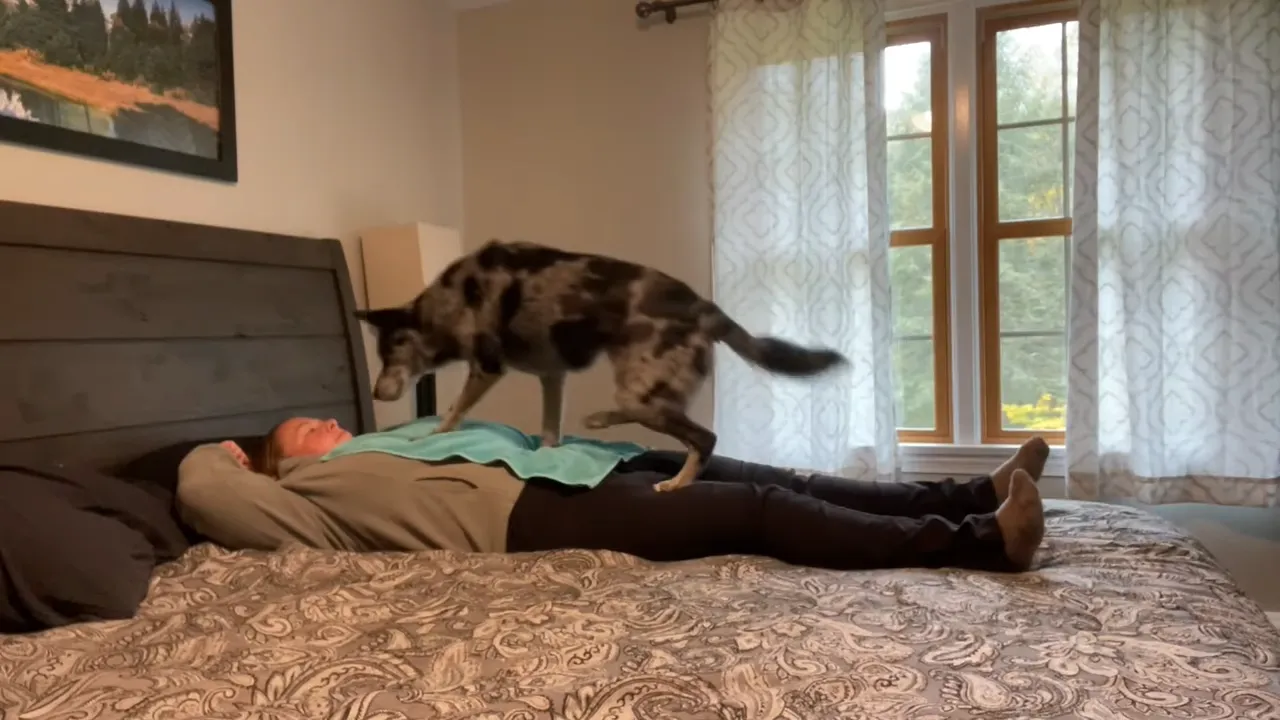In this article, we’re sharing a YouTube video from Laura at Doggy U, where Laura has been a certified guide dog trainer for over 12 years.
Let’s hand it over to Laura …
Today, I’ll share insights on a powerful method called Deep Pressure Therapy (DPT), which involves using your dog’s body weight to help manage conditions like anxiety, ADHD, and more.
What is Deep Pressure Therapy?
DPT utilizes your dog’s mass to activate the parasympathetic nervous system…
This shift helps move your body from a ‘fight or flight’ response to a state of calmness, significantly lowering your heart rate and blood pressure.
It’s particularly beneficial for those dealing with autism spectrum disorders, anxiety, and PTSD, and even helps reduce the severity of migraines.
Selecting the Appropriate Dog for DPT 🐶
Not all dogs are ideal candidates for DPT. 🌟
It’s essential to choose a dog that is not body-sensitive and is comfortable stepping over and laying on you…
This comfort ensures the therapy’s effectiveness and your dog’s well-being.
Remember, teaching your dog DPT doesn’t automatically qualify them as a service dog; this requires extensive training and a diagnosed disability per ADA (USA) guidelines.
Training Methods and Techniques
There are various ways to teach DPT, but one effective approach is what I refer to as “sternal deep pressure therapy,” in which the dog lies primarily on your chest.
This method might be particularly beneficial for inducing calmness, though it’s not typically suited for public settings like restaurants.
However, it can be modified for more private settings, such as in a car or on the couch at home.
Foundational Steps in Training
Before diving deep into DPT, it’s crucial to ensure your dog is comfortable with basic commands and behaviors…
Start by familiarizing them with uneven surfaces to mimic the contours of a human body.
Establishing a solid down-stay command and shaping behaviors toward going to a designated place is foundational before moving on to the more complex tasks involved in DPT.
Training DPT requires patience and consistency.
Begin by working in controlled environments and gradually introduce your dog to more varied settings…
Use shaping techniques to help the dog learn to respond independently, which is crucial when you cannot give direct commands.
Remember to incorporate rewards strategically and consistently reinforce commands with positive reinforcement…
As your dog becomes more comfortable with the tasks, you can begin reducing the guidance and allowing them more autonomy in positioning during therapy sessions.🐾


13 responses to “How to Train Your Dog in Deep Pressure Therapy: Expert Tips”
kamagra 50 mg low cost
moins cher kamagra sans ordonnance
get enclomiphene generic order
comprar enclomiphene pela internet
get androxal cheap europe
how to buy androxal price in canada
how to buy flexeril cyclobenzaprine american pharmacy
how to order flexeril cyclobenzaprine generic flexeril cyclobenzaprine
cheap dutasteride buy virginia
Buy dutasteride online without a dr approval
buying gabapentin generic usa
pharmacy gabapentin no prescrption
buy fildena tablets australia
how to order fildena buy sydney
how to buy staxyn cost usa
buy cheap staxyn purchase generic
cheap itraconazole generic pricing
buy itraconazole usa seller
get avodart generic is good
cheapest buy avodart lowest cost pharmacy
cheapest buy xifaxan generic in canada
order xifaxan buy san francisco
rifaximin without prescription cheap
rifaximin canada prescription
přes přepážku kamagra alternativa
kamagra levné